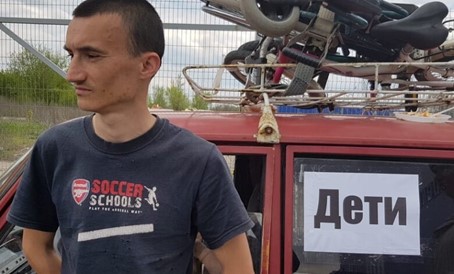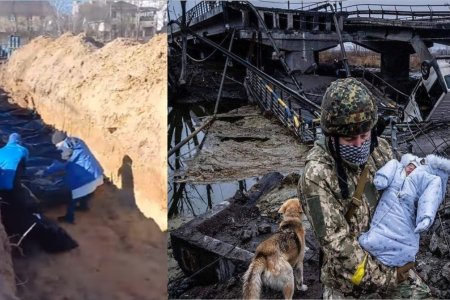
Mayor of Bucha Anatoly Fedoruk was recently asked when the Russian invaders began shooting civilians. He assumes, he said, that this was when they realized that they could not take Kyiv. It has certainly seemed in Kharkiv and other cities that Russia has ‘compensated’ for lack of military achievements by bombing civilian targets.
The same kind of link, on an individual scale, is confirmed in the testimony of one civilian from the village of Orlyanske in the Zaporizhzhia oblast, 27-year-old Mykola Zakharchuk. He survived and managed to get his family to safety, and has since provided details of how he was tortured to the Media Initiative for Human Rights which is documenting war crimes and crimes against humanity committed in connection with Russia’s war against Ukraine.
Zakharchuk has absolutely no link with Ukraine’s military and, before the war began, worked in a mobile telephone shop. He explains that after the village was seized by the Russians, most residents tried to stay inside as much as possible. There was, however, no electricity or gas, and food and water supplies could only last for so long. Zakharchuk had a wife, two small children and a bedridden mother-in-law to provide for and therefore set out on his bike in search of food and water.
He was stopped by Russian soldiers in a KAMAZ truck who took him to a building that they had taken over. He told them that he was a civilian, but they demanded that he strip, and looked for tattoos and marks from a rifle. They found nothing, but were clearly angry and wanting to vent their fury on him. Zakharchuk recalls that they showed him a Russian armed vehicle that had been hit by the Ukrainian military, with eight bodies inside.
They completely lost it, he says, and shouted that it was because of him. “Why did your lot start shooting at us? We just entered normally. Your lot started shooting at us!”
Such indignation from invaders is difficult to take seriously, but they clearly wound themselves up and used the deaths as an excuse for savagely beating and torturing the young Ukrainian civilian. Several Russians both hit and kicked him, and then made him stand next to a post. He was sure that they were going to shoot and kill him, but then they changed their mind and told him to “get into the pit and pray”. The pit that they pushed him into was like a sewage pit, and was full of rubbish. The Russians aimed their weapons at him and one of them showed a grenade, having already pulled out the pin, asking if Zakharchuk knew what it was.
The young man was convinced he was about to die. He recalls that he did not see his life flashing before him as people stay. Instead, all he could think about was that he hadn’t told his wife, Zoya, where he was going, and he feared she would come looking for him. He also prayed, reciting the Lord’s Prayer, with this noticed by the Russians who asked if he was a believer. When he replied that he was, they decided to see if he could tell them about Psalm No. 90. He could, and did so slowly. It was after this, he says, that one of the commanders told the Russians to release him.
The situation with food in Orlyanske was dire, and Zakharchuk decided to take his family to government-controlled Zaporizhzhia, and from there, a bit later, to western Ukraine. They left everything behind, but at least are safe.
He told the Media Initiative for Human Rights that he remembers all of those who tortured him. When the time comes, he will recognize each and every one of them in court.
As of 13 May, Ukraine’s Prosecutor General has registered 11,239 alleged crimes of aggression and war crimes since 24 February.
On 12 May, the UN’s Human Rights Committee (which Russia was recently expelled from because of its invasion) met in special session and adopted a Resolution on the deteriorating human rights situation in Ukraine stemming from the Russian aggression . UN High Commissioner for Human Rights Michelle Bachelet made a point of stating that there were some reports implicating Ukrainian forces, “Russian forces were likely responsible for most casualties”. She spoke of 1,000 civilian bodies having been “found in the Kyiv region alone. Some had been killed in hostilities, but others appeared to have been summarily executed. … These killings of civilians often appeared to be intentional, carried out by snipers and soldiers. Civilians were killed when crossing the road or leaving their shelters to seek food and water. Others were killed as they fled in their vehicles.”
It is likely that many more crimes will be uncovered once the Russians are driven out of areas, including those in the Zaporizhzhia oblast, that they are currently occupying.



